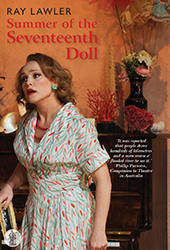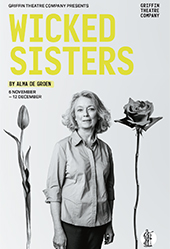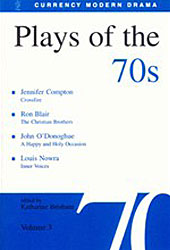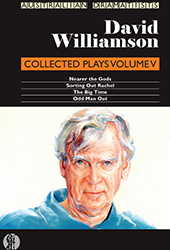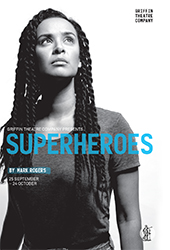Shop
Summer of the Seventeenth Doll (new edition)
$23.99
Available here as a single edition.
Also published in The Doll Trilogy.
Summer of the Seventeenth Doll is an Australian play first performed in 1955 and then first published in 1957. The play is set in an old house in Carlton, Melbourne, in early December of 1953. Lawler's revised script (2012) of his (and Australia's) most famous play, explores the long term relationship between two larrikin Queensland cane cutters - Roo and Barney - and the women they visit every year in the off season - Olive, Bubba and Pearl. In this final Summer all awaken to middle-age and realise that things have or must change.
The impact of The Doll cannot be over-stated. Its success both here and abroad was quickly recognised as a defining moment in Australian theatre history.
Read Alana Valentine's response to Summer of the Seventeenth Doll in An Ever-Changing Idiom, a free essay from Currency Press.
[[PDF? &filename=`2584_CP_Summer-of-the-Seventeenth-Doll-STATE_THEATRE_SA_EDUCATION_RESOURCE.pdf` ]]
- drama, realism
- 0
- 7 total
- 4 female identifying, 3 male identifying
- history, gender, women
- 18+
- young adult, adult
- Currency Press
- MONOLOGUES
- LINKS & DOWNLOADS
- PRODUCTION HISTORY
You can preview the full online text with a Membership
Olive
Female | 30s | under 3 minutes
Starts on page 0
EXTRACT: [with a slight shudder] It's different all right. Compared to all the marriages I know, what I got is...[groping for depth of expression] is five months of heaven every year. And it's the same for them. Seven months they spend up there killin' themselves in the cane season, and then they come down here to live a little. That's what the lay-off is. Not just playing around and spending a lot of money, but a time for livin'. You think I haven't sized that up against what other women have? I laugh at them every time they try to tell me. Even waiting for Roo to come back is more exciting than anything they've got (Act 1, Scene 1).
Adult themesBarney
Male | 40s | under 3 minutes
Starts on page 0
EXTRACT: Well, first set off, Roo, the silly cow, strains his back - There's no need to throw a fit, nothin' serious, nearly better. But it slowed him down all through the season, see. Roo's a pretty hard man, y'know, on the job. Got no use for anyone can't pull their weight; and bein' able to pick and choose almost, 'coz everyone knows he's one of the best gangers there is, gen'rally he gets a champion bunch together. But, he's gotta be hard doin' it sometimes. This year he got the boys to turn off Tony Moreno. (Act 1, Scene 1)
LINK: PLAYING THE 20TH CENTURY - EPISODE FOUR
ABC RADIO NATIONAL, PLAYING THE 20TH CENTURY, 9 JANUARY 2011
Preceding the production of Summer of the Seventeenth Doll, a short feature by Regina Botros which contains archival interviews with Ray Lawler, Michelle Arrow, senior lecturer in Australian history, John McCallum, theatre critic, lecturer and author, Katharine Brisbane, co-founder and executive director of Currency House and Ralph Myer, artistic director Belvoir Street Theatre, Sydney.
TEACHERS' NOTES: SUMMER OF THE SEVENTEENTH DOLL
BELVOIR
PDF Teachers' Notes for Belvoir's production of 'Summer of the Seventeenth Doll'.
ARTICLE: A LUCKY PLAY
STEVE MEACHAM, SYDNEY MORNING HERALD, 3 SEPTEMBER 2011
""It has always been a lucky play,'' a lively Ray Lawler chuckles when asked why the sad, working-class drama he wrote 57 years ago wasn't merely an unprecedented success at the time, but is still so relevant today it can entice such contemporary theatrical talents as Neil Armfield, Robyn Nevin and Susie Porter into a new production."
REVIEW: SUMMER OF THE SEVENTEENTH DOLL
LUKE BUCKMASTER, CRIKEY, 20 JANUARY 2012
"There are plenty of jokes but Summer of the Seventheeth Doll is a cynical and bruising work. It exists in a nebulous distance between classes and aspirations, an intersection between past and progress where nostalgic memories combined with cold realities of an imagined future provide prisons for the characters, partly self-made, partly societal, and fully, in some context, shared with audiences."
REVIEW: A CLEAR-EYED REVIVAL FOR THE 21ST CENTURY
JOHN MCCALLUM, THE AUSTRALIAN, 30 SEPTEMBER 2011
"THE Doll is a classic in the sense that it has been produced, studied and loved for more than 50 years, but it is also a play of its time. Neil Armfield's revival is so fresh and alert that the play becomes a classic in the other sense: it has new things to say to each generation."
LINK: OLIVE AS TRAGIC HERO: SUMMER OF THE SEVENTEENTH DOLL
ALISON CROGGON, THEATRE NOTES, 1 MAY 2012
Transcript of a talk Alison gave at the Wheeler Centre as part of the series Australian Literature 101.
REVIEW: SUMMER OF THE SEVENTEENTH DOLL
ALISON CROGGON, THEATRE NOTES, 24 JANUARY 2012
"Lawler's story of itinerant cane cutters who migrate to Melbourne every summer for the lay off is a parable of fantasy coming into brutal collision with reality and, like all tragedies, a meditation on mortality."
EDUCATION RESOURCES
STATE THEATRE COMPANY OF SOUTH AUSTRALIA
Study Guide & Activities from the State Theatre Company of South Australia
PLEASE NOTE: This page contains links to files that have been sourced, and websites that are maintained by other businesses and organisations. Please refer to our terms of use.
PLEASE NOTE: You will be directed to AusStage.edu.au for search results; Australian Plays Transform is not responsible for their completeness. Refer to our terms of use.

